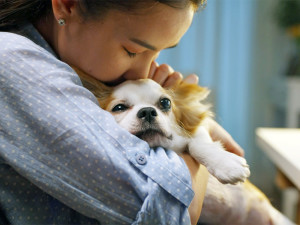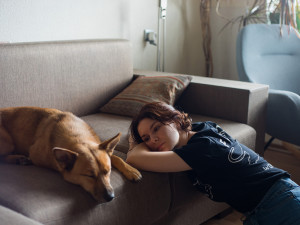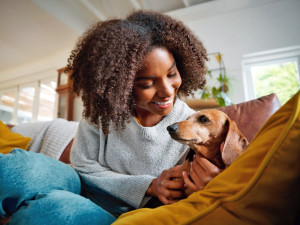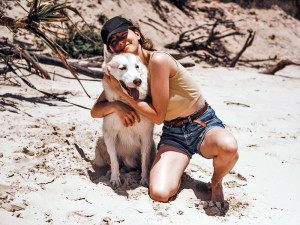Here’s How Much It Costs To Adopt a Dog in the UK
Get your calculator out – it’s time to do some maths
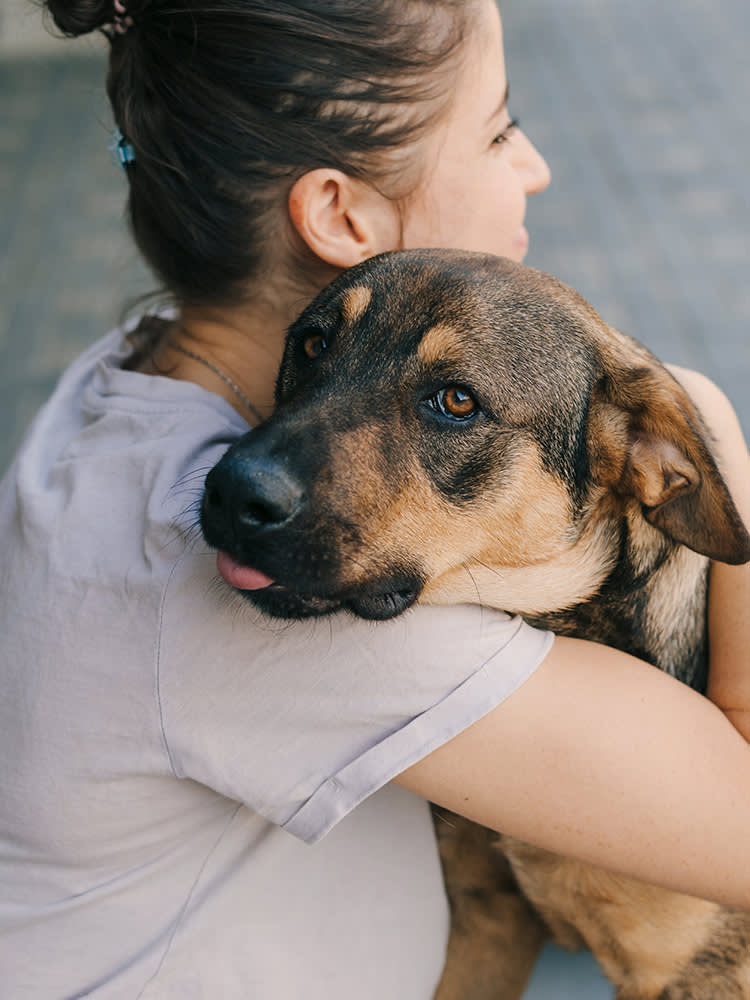
Share Article
Looking to adopt a dog? That’s amazing news, we’re so excited for you! No doubt your mind is currently occupied with dreams of woodland dog walks, cuddles in bed and showing your new mate off at the pub, but may we interject for a hot minute? Have you considered what impact it will have on your finances?
We know, we know, it all sounds very dull, but beyond the initial adoption fee there are so many other costs to consider. Taking some time to do the maths now will ensure you’re fully prepared and reduce the risk of realising you can’t afford your pet further down the line. The cost-of-living crisis has seen many pet parents facing the heartbreaking decision of rehoming their dogopens in new tab, and that’s something no pet parent should ever face. To help you figure it out, we looked into the key expenses when adopting a dog in the UK.
Overview: how much it actually costs to adopt a dog
You could be looking at spending in excess of £1,000 to set yourself up for a new dog, and that’s not even taking into consideration the money you’ll spend over the course of your dog’s life. Feeling overwhelmed? Don’t be – we’ve done the legwork for you.
How much it costs to adopt a dog, broken down
Initial adoption fee
Your first major expense when adopting a dog is the adoptionopens in new tab fee, which varies greatly from shelter to shelter – be aware that puppies tend to incur a higher fee than adult dogs. Fees range from as little as £120 for an adult dog at the RSPCA Newcastle and North Northumberland branchopens in new tab, to £500+ for a puppy (under six months old) at Blue Crossopens in new tab.
Fees generally include a vet check, neutering, microchipping, vaccinations and up-to-date flea/tick/worm preventatives. Many also offer post-adoption behavioural care, and some even throw in a collar and lead, some food (to help your new dog transition to their new diet), and a month of pet insurance. Nice.
If you’re wondering why some fees are much higher than others, it’s important to remember the costs involved in rescuing and rehabilitating animals, which will vary according to the cost of living in that area. An RSPCAopens in new tab spokesperson broke it down for us: “It costs us a great deal to care for, rehabilitate and rehome the animals in our care, and an adoption fee goes towards the cost of some of the treatments we provide such as veterinary treatment, accommodation, food, treats and toys, and can go towards veterinary expenses – such as microchipping and neutering – that would usually add up after buying a pet.”
Side note: if you live in Northern Ireland you’ll also need to buy a dog licenceopens in new tab. This costs £12.50 per year, or £5 if the dog has been sterilised.
Veterinary expenses
Even if initial vet expenses such aa neutering and vaccination are covered by the rescue centre, you’ll still need to be prepared for routine care and any future hiccups.
Research by ManyPetsopens in new tab reveals that the average cost of a 15-min vet consultation in the UK in 2025 is £58.29. Follow-up appointments tend to be slightly cheaper, while out-of-hours emergency appointments are much higher. Recent data from Vet Help Directopens in new tab shows that the average out-of-hours emergency vet consultation fee is a whopping £250. Yikes.
Diagnostics and treatment can incur huge charges, so it’s wise to get pet insurance. According to Compare the Marketopens in new tab, the average dog insurance premium is £145 per year, but this will vary depending on the breed and age of your dog, where you live and the type of cover you get. Remember that insurance won’t always cover the full cost of treatment, so it’s important to have money set aside for emergencies.
You also need to factor in annual booster vaccinations and regular flea/tick/worm preventatives. Vets often offer health plans that cover this, averaging at around £25 per month.
Microchipping costs
It’s a legal requirement in the UK that all dogs over eight weeks old are microchipped. Dogs adopted from shelters should already be chipped – if not, you’re looking at a cost of £10 to £30 to have this done, according to the PDSAopens in new tab.
Basic dog supplies
Dogs may be simple animals but they still require a fair few bits and bobs to keep them safe and happy. “Your dog will need some essentials right from the get-go, so you’ll need to go shopping before bringing your new pal home,” advises Lindsay Arliss, a dog behaviour and training specialist at Woodgreen Pets Charityopens in new tab who knows a thing or two about rehoming pooches. “Costs vary but you may be looking at around £300 to £1000 to set yourself up. It’s possible to pick some of these bits up secondhand, saving yourself some pennies.”
Here’s Lindsay’s list of necessities:
Bed/blankets, including spares in case you need to wash them.
Food and water bowls.
Dog food.
Poo bags.
Training treats.
Collar/harness and lead – you may need both a fixed-length lead for walking and a longline for recall practice.
Name tag with your name and address on (this is required by law).
Crate or a suitable car travel harness (if you have a car).
Toys, chews or puzzle toys for mental stimulation.
Feeding costs
It’s hard to give an estimate for feeding costs as it depends on the size and breed of your dog, and whether you’re buying them basic dry food or signing up for a bougie fresh food subscription. Costs could be as low as £10 a month for a small, inactive dog eating dry kibble, to over £160 a month for a large, active dog munching on human-grade meals.
When it comes to treats, you’re looking at around £1 to £4 for a small bag.
Training costs
You never really know how a shelter dog will settle into their new environment, so it’s vital to have money set aside for training sessions, just in case. “Separation anxiety is a common issue with newly adopted dogs,” explains Jo Sellers, dog trainer and certified separation anxiety specialist at Pippin Pets Dog Trainingopens in new tab. “Then there’s resource guarding and reactivity to other humans or dogs, which stem from uncertainty, fear or lack of social skills.”
Even if there aren’t any obvious issues, a professional can help you learn how to communicate with your dog effectively, which will strengthen your bond and help keep them safe.
Many dog shelters offer post-adoption behavioural support, but it won’t be as comprehensive as private training. ManyPetsopens in new tab reports that the average price of a group training session is around £19, rising to around £60 for a one-to-one training session.
Optional and additional costs
Grooming
If your dog has luscious locks, they’ll need regular trips to the groomer to keep them looking (and feeling) their best. According to Pedigreeopens in new tab, the average cost of a grooming visit for a small to medium-sized dog is £43, though this can range from £20 to £100+ depending on the area and type of treatment.
Pet sitting and boarding
Unless you’re lucky enough to have friends or relatives who’ll look after your dog while you’re on holiday or at work, you’ll need to factor in pet sitting costs. The average price of a full day of doggy daycareopens in new tab in the UK is £26.68. Need overnight care? WoofConnect opens in new tab reports that 24 hours at a kennel costs from £15 to £35, while in-home dog boarding can range from £25 to £100+.
Dog walking
If you struggle to fit walkies into your busy schedule, you’ll need to enlist the help of a local dog walker who can take your furry angel out for their squats and sniffs. You’ll be required to shell out around £18, which is the average cost of an hourly dog walkopens in new tab.
Tips for budgeting before you adopt a dog
Financial stress is the worst, so it’s best to whip out your calculator and crunch some numbers before committing to a dog for life. First, figure out your initial expenses, like the adoption fee, veterinary treatments and things like beds, bowls, and leads, etc. Then work out your recurring costs – think food, grooming, veterinary preventatives, insurance, doggy daycare, etc. Now it’s time to have a serious think about any unexpected costs that may arise – do you have enough money in the pot to cover an emergency vet visit or expensive surgery?
Final thoughts: how much it costs to adopt a dog
There’s no doubt about it – dogs cost money, and we’re not just talking about the initial adoption fee. It can cost from £300 to £1000 to buy all the bits you need for a new dog, and then you’ve got ongoing costs after that. There’s no shame in not being able to afford a dog – times are tough right now. Waiting until money isn’t such an issue will make life less stressful for both you and your dog.
Frequently asked questions
How much does it cost to adopt a dog in the UK?
Adoption fees vary depending on the charity, and fees tend to be higher for puppies. Costs can be as low as £150 and as high as £500.
Is dog adoption free in the UK?
No, dog shelters in the UK generally ask for an adoption fee, which covers part of the costs involved in rescuing and rehabilitating the dog, as well as initial vet costs such as neutering, vaccinating, microchipping and parasite prevention.
Is it cheaper to adopt or buy a pet?
It’s generally a lot cheaper to adopt a dog from a shelter – purebred dogs from reputable breeders can cost thousands, while you can adopt a rescue dog from as little as £150. Remember that reputable breeders have huge overheads thanks to stud fees, licensing costs and vet bills.
How long does it take to adopt a dog in the UK?
Many people have voiced frustration with the UK shelters and their lengthy adoption processes, choosing to adopt a dog from overseas or buy one online (eek!) instead. However, all good things take time, which is why it can take a while for rescue centres to find your perfect match. In some cases you could be taking your new dog home within days, but for others it may take months.
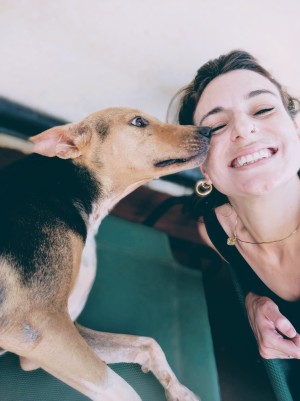
Lisa Bowman
Lisa is a writer whose work has been featured in the likes of Stylist, Metro and The Guardian. She spends her days at a computer so she can bankroll her two rescue dogs, who may or may not be The Cutest Dogs in the World.
Related articles
![woman hugging dog]()
Where to Get Help If You’re Struggling to Afford Your Pet
If you’re struggling with pet care costs, you are far from alone and there’s no shame seeking help. Here’s a few places to start
![A tan dog sleeping on the couch while a short haired woman rests on her arms on the edge of the couch looking at the dog sadly]()
The Mental Health Cost of Working in Animal Rescue
As more and more animals come into the care of rescue centres, those who care for them are suffering, too
![a picture of an Alaskan Malamute with its paws up on a cage door]()
These Dogs Wait The Longest In Rescue Centres To Be Adopted
They might be bigger, but that just means there’s more of them to love
![a woman with curly hair smiles down at her daschund]()
How Much Does it Cost to Have a Dog?
We got our paws on a calculator and did the research so you don’t have to
![girl in a yellow top and baseball cap hugs a big fluffy white dog on a beach]()
Is It More Ethical to Adopt a Dog From Overseas Or From the UK?
You’ve chosen to adopt a dog, congratulations! But with dogs in need both here and abroad, which route should you take?
![A dog lying on a rug with a litter of puppies feeding from her.]()
Why You Shouldn’t Adopt a Pet From Social Media or Buying/Selling Sites
It’s not quite the same as buying secondhand clothes…

